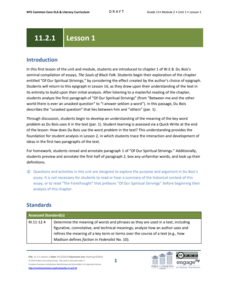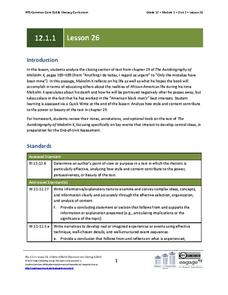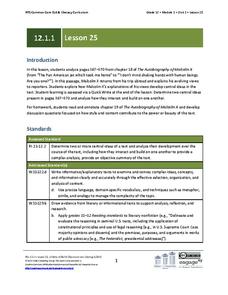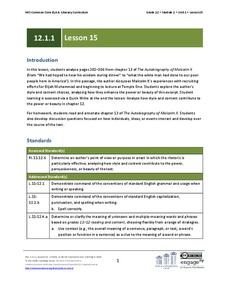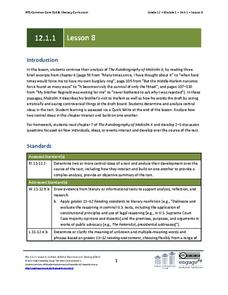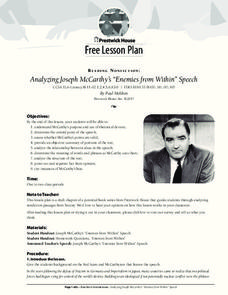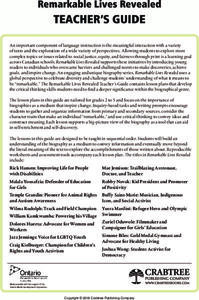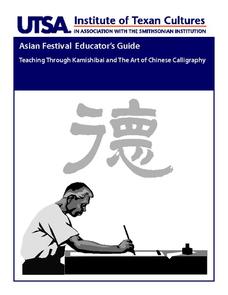EngageNY
Grade 11 ELA Module 2: Unit 1, Lesson 8
Was freedom really free? Scholars analyze paragraphs six and seven of Du Bois's chapter "Of Our Spiritual Strivings." They look at how the author uses rhetoric to strengthen his point of view about freedom. Learners complete a Rhetorical...
EngageNY
Grade 11 ELA Module 2: Unit 1, Lesson 3
Go figure! Scholars examine the figurative language in the last half of W.E.B. Du Bois's work "Of Our Spiritual Strivings." They pay special attention to his metaphors and develop ideas with group discussion and guided questions....
EngageNY
Grade 11 ELA Module 2: Unit 1, Lesson 1
When is a word more than just a word? Scholars examine the significance of a word used by W.E.B. Du Bois in "Of Our Spiritual Strivings." Readers carry out a deep discussion of the use of the word problem in the text. After sharing ideas...
EngageNY
Grade 11 ELA Module 2: Unit 1, Lesson 22
Say precisely what you mean. Scholars analyze the importance of Washington's precise language in paragraphs eight and nine of the "Atlanta Compromise" speech. They interpret his figurative language and add it to their Idea Tracking...
EngageNY
Grade 11 ELA Module 2: Unit 1, Lesson 23
Work together for the higher good. Scholars look at paragraph 10 in the "Atlanta Compromise" speech in which Washington pledges African American cooperation. Readers determine the connection between two central ideas and how they build...
EngageNY
Grade 11 ELA Module 2: Unit 1, Lesson 19
Scholars look at paragraphs two and three in the "Atlanta Compromise" speech. They analyze how Washington uses a story about a ship lost at sea and rhetorical devices to develop his point of view. After class discussion and completing...
EngageNY
Grade 12 ELA Module 1, Unit 2, Lesson 2
As part of their reading of Leslie Marmon Silko's "Yellow Woman and a Beauty of the Spirit," class members analyze how the author develops her narrative through dialogue, description, and multiple plot lines.
EngageNY
Grade 12 ELA Module 1, Unit 2, Lesson 4
The fourth instructional activity in this narrative writing unit focuses on how Leslie Marmon Silko uses telling details and sensory language in her "Yellow Woman and a Beauty of the Spirit" to bring alive the people of Laguna Pueblo and...
EngageNY
Grade 12 ELA Module 1: Unit 1, Lesson 26
Readers use their annotations and questions about chapter 19 of The Autobiography of Malcolm X to guide their discussion of the final chapter of the text.
EngageNY
Grade 12 ELA Module 1: Unit 1, Lesson 25
Class members return to the discussion of The Autobiography of Malcolm X using the questions they developed and their annotated notes of the events in chapter 17.
EngageNY
Grade 12 ELA Module 1: Unit 1, Lesson 17
Integration versus separation. Readers of chapter 14 of The Autobiography of Malcolm X examine Malcolm X's views on other Civil Rights leaders and their integration ideas. Class members also return to the narrative essay strand of the...
EngageNY
Grade 12 ELA Module 1: Unit 1, Lesson 16
Class members discuss Chapter 13 of The Autobiography of Malcolm X and use evidence from their character development worksheet to support an analysis of how Malcolm X and attitudes toward him and his teachings are changing.
EngageNY
Grade 12 ELA Module 1: Unit 1, Lesson 10
Readers examine the rhetorical devices Haley uses in chapter 8 of The Autobiography of Malcolm X, paying particular attention to the diction and syntax and how these choices reveal changes in Malcolm X's point of view.
EngageNY
Grade 12 ELA Module 1: Unit 1, Lesson 15
Chapter 12 of The Autobiography of Malcolm X discusses Haley's narrative techniques, mainly how he uses point of view and foreshadowing to build interest and suspense. Class members read and annotate chapter 13 of the text as homework...
EngageNY
Grade 12 ELA Module 1: Unit 1, Lesson 8
Readers use the provided worksheet to analyze the narrative techniques Haley uses in chapter 6 of The Autobiography of Malcolm X to continue the development of the central ideas of racial identity and systemic oppression.
Curated OER
An Electronic Self-Portrait Lesson Plan - A Unit for Middle School
Using a photo of themselves for inspiration, learners create a multi-media self-portrait. A digital image of each child is taken, it is uploaded into the computer where is can be experimented with in a digital format. Young artists then...
Curated OER
Lesson Ideas for Comparing and Contrasting Content
Here are three lesson ideas to help students learn how to compare and contrast information in any content area
Fallbrook Unition Elementary School District
Narrative Writing
Enhance narrative writing instruction with engaging and interactive planning pages. Eight lessons take authors through the process of writing a narrative story, two lessons prompt writers to create a personal narrative, and a...
University of Wisconsin
BEAM: Background, Exhibit, Argument, Method
Thinking of assigning a research paper? Get writers off on the right foot with a lesson that introduces the BEAM research model. Writers brainstorm the background of their topic, explicate the aspects of their topic, consider the...
Global Oneness Project
Flamenco: A Cross-Cultural Art Form
Notes of pride and persecution, exclusion and isolation resonate in flamenco. Introduce this musical art form to your social studies or Spanish language classes with a resource that follows a young flamenco guitarist as he...
Prestwick House
Reading Nonfiction: Analyzing Joseph McCarthy's "Enemies from Within" Speech
Looking for a lesson that teaches class members how to analyze nonfiction? Use Joseph McCarthy's famous "Enemies from Within" speech as a instructional text. Worksheet questions direct readers' attention to the many historical...
Crabtree Publishing
Remarkable Lives Revealed
Six lessons make up a unit all about biographies. Scholars read about a remarkable life while taking notes and identifying characteristics of the biographical genre. Readers examine the tale's obstacles, accomplishments, and sequence of...
Carnegie Library
Creative Writing: Middle School Lesson Plan
Enhance a unit on historical fiction with an engaging writing lesson. Learners bring the Industrial Era to life as they compose their own historical fiction pieces based on primary source images of Pittsburgh steel workers.
UTSA Institute of Texas Cultures
Teaching Through Kamishibai and The Art of Chinese Calligraphy
Young learners discover kamishibai, a popular Japanese storytelling art, and explore how these Japanese folktales illustrate the country's cultural themes and values through discussion and storyboarding.
Other popular searches
- Art Lessons Primary
- Visual Art Lessons
- Visual Art Lessons Symmetry
- Elementary Art Lessons
- Compass Rose Art Lessons
- Art Lessons Primary Penguins
- Edible Art Lessons Primary
- Picasso Art Lessons
- Art Lessons Primary Easter
- 3d Art Lessons Primary
- Christmas Art Lessons
- Ceramic Art Lessons




